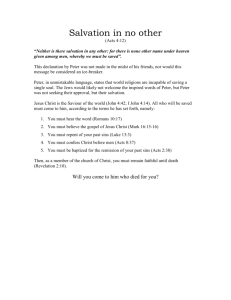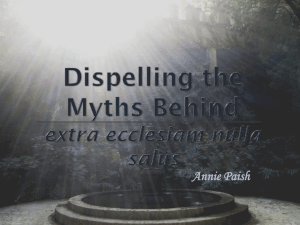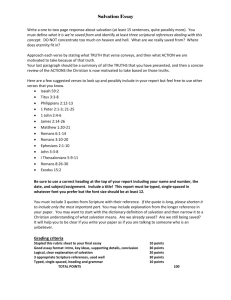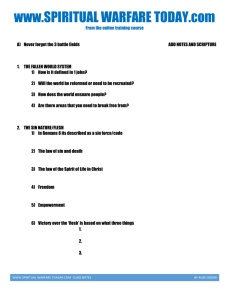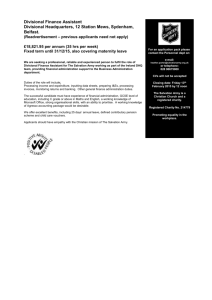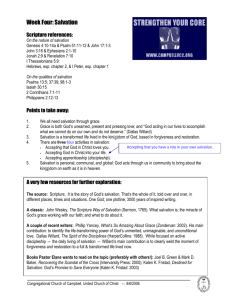01 1 Peter 1v1-5 Salvation - Grounded and Accomplished
advertisement
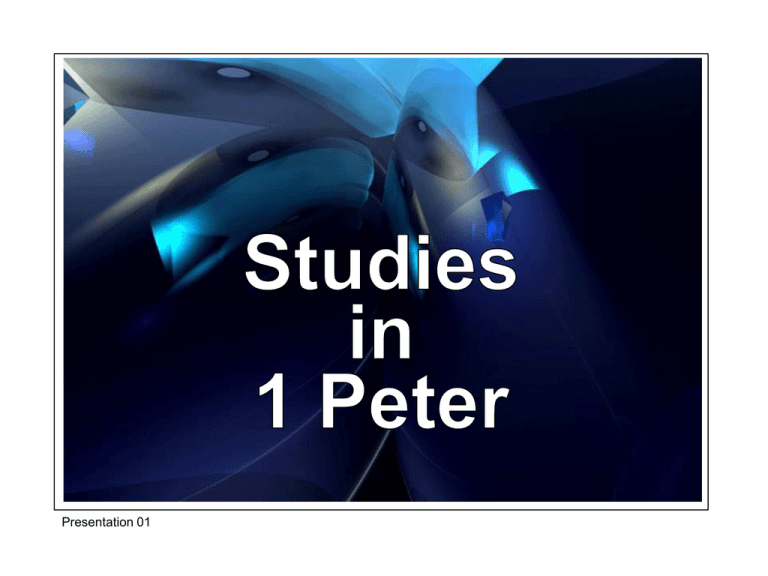
Presentation 01 Introduction Peter wrote this epistle as a mature apostle. It has been viewed as a partial fulfilment of the commission given him by the risen Jesus in Jn. 21.17, 'feed my sheep'. In other words the epistle is pastoral in nature. Is was written to Christians in Asia Minor possibly to those not reached by Paul [Acts 16. 6-7]. It is addressed to the ‘Diaspora’ – a technical term used to describe Rome Asia Minor the scattered Jewish nation. However, the church had also been Ephesus Lystra scattered by persecution and so the term is equally applied to Christians who had been scattered in this way. Jerusalem Introduction The epistle seems to have been written before Nero's persecution, which began A.D. 64 and was confined to Rome. The official persecution of Christians by the state did not start until A.D. 110 [this is described in Pliny's letter to Trajan]. It would appear from 2.13-14 that the persecution of the church, though not official, was nevertheless that of a society which had the backing of local government who in turn were opposed to Christians and their value system. The church continues to be persecuted in our own day. The Structure of the Book 1v1-2 1v3-5 1v6-9 1v10-12 1v13-21 1v22-2v3 2v4-12 2v13-17 2v18-25 3v1-7 3v8-17 3v17-22 4v1-6 4v7-11 4v12-19 5v1-11 5v12-14 Salvation: grounded in the Godhead Salvation: accomplished in their hearts Salvation: confirmed by their suffering Salvation: anticipated through history Salvation: outworked in their lives Salvation: and the Word of Truth Living Stones - Chosen People Submission to the State Submission to Superiors Wives and Husbands The Believer and Suffering Christ’s Victory Responding to Christ’s Victory Living for God Suffering for Christ Elders and Young Men Final Greetings Salvation: Grounded in the Godhead Peter offers his credentials. He writes as an ‘apostle’ - ‘a sent one’. The word ‘apostolos’ is sometimes used in a wider sense than that of the 12 apostles in the N.T. cf. Rom. 16.7. The 12 apostles of which Peter was one were uniquely equipped by Jesus to be authoritative expositors and recorders of the gospel. Jn 14.26.... Peter addresses Jewish and Gentile converts as 'God's elect'. cf. Eph. 1.3-5. God chooses and calls men and women out of the world and into fellowship with himself. Unlike man, when God chooses he has no regrets. See also Rom 8.28-30.... Salvation: Grounded in the Godhead Peter points out that all three persons of the Godhead are involved in the work of salvation. This diverse yet complimentary involvement has caused theologians to coin the expression ‘The Economic Trinity'. 1. The Plan is the Father’s who chooses us. 2. The Sacrifice is made by the Son who executes the plan by his death upon the cross. 3. The Application is made by the Spirit who Sanctifies. The Holy Spirit applies the saving work of Christ. His purpose is to make us like Jesus. He does this by creating within our hearts a new nature capable of obedience and then he goes on to encourage us to become an obedient people. Salvation: Grounded in the Godhead Moses sprinkled the blood of an animal sacrifice upon Israel thus sealing the covenant relationship between Israel and God. Ex.24.3ff The blood of sprinkling spoke of a ceremonial cleansing and a covering for sin. The message of the O.T was, ‘blood makes clean....’ and ‘sacrificial death brings blessing’. Note also the use of sprinkled blood by the High Priest on the day of atonement Lev 16. The ‘sprinkling’ Peter describes refers to the blood of Jesus under the New Covenant. It does much more: it secures our forgiveness, it cleanses our conscience and creates access into the presence of God for every believer, cf Heb.9.11-14 Salvation: Grounded in the Godhead Peter encourages his readers by pointing out that their salvation was grounded in the work of all three persons of the Godhead. God the Father has an eternal purpose for each on of them. God the Son died upon the cross to deal with ever barrier, including their sin, which might frustrate God’s glorious purpose. God the Holy Spirit makes that purpose a reality by outworking it in the lives of God's people. Salvation: Grounded in the Godhead Peter's opening salutation is a Christian adaptation of a common first century greeting. The word ‘grace’ was not used in this way outside of the Christian community. Christians used it because they had been overwhelmed and mastered by God’s undeserved favour. They realised that the very best that they could wish for another was that God would be gracious to them. The word ‘peace’ had a deeper significance in Christian letter writing than in common usage. Only the Christian can truly be at peace because Jesus by his death has made peace possible. God and sinners are reconciled! Eph.2.14-18 Salvation: Peter cannot think of God's provision of salvation without launching into praise v3. The root meaning of the expression 'praise be' is ‘to speak well of’ and this is precisely what Peter does here. The salvation which he describes is unearned and Undeserved, rooted in the mercy of God. It is decisive, revolutionary, irreversible – it is a ‘new birth’. Simply put, becoming a Christian involves a spiritual birth. Cf. Jn.3.3. Think about it, once you have been born you cannot be unborn. How wonderfully reassuring that knowledge is. Salvation: The new birth opens up a door into a world of grace marked by a ‘living hope’. Psychologists tell us men need hope to cope with the future. Many human hopes are bitterly disappointing. Some are unrealistic, like the student who hopes for a good degree but never studies. Some hopes are uncertain because of circumstances beyond our control cf. The hard working farming whose hopes of a good harvest are destroyed by a flood. Or think of the young couple who hope for years of happy marriage but then one of Them meets with a fatal injury. Our most reasonable human hopes seem fragile like a jig-saw broken up before it is complete. Hopelessness caused H. G. Wells to write, 'Life is a huge ugly joke barging across the universe’. Salvation: Against this background Peter speaks of a hope that is certain. The Christian inheritance is described in the following manner. It is: 1. Imperishable. It cannot be spoiled by our death. 2. Undefileable. It cannot be ruined by evil, neither by our own wickedness, nor that of others. 3. Unfading. It is not damaged by the passing of time but remains everlastingly fresh and sweet. The hopes of this world fade with the passing of time and human expectancy grows dim. In contrast, John Bunyan, with this Christian hope in mind wrote, 'the thoughts of what I am going to lie like a glowing coal on my heart.' Salvation: By unpacking the secure salvation of God into which his readers had entered, Peter contrasts it with those things men hold dear in this life. Things which spoil and do not stand the test of time. For hundreds of years the Parthenon in the Acropolis in Athens was described as the most beautiful building in the world. Today the polluting atmosphere from road traffic has caused considerable Damage, as has an explosion which tore a great chunk out of its side, when it was used as a munitions store! The inheritances of this world fade and lose their splendour. Salvation: Many children have developed the art of flower pressing as a hobby. Flowers are selected because of the intensity and brilliance of their colours. They are then pressed flat inside a heavy book. But years later, when they look at their pressed flowers, the colours are muted and have lost their original brilliance and appeal. Joseph Turner a famous water-colour artists from the UK has many of his works in the National Gallery. They are seldom on display. Why? Because both daylight and artificial light cause the paintings to fade. Their beauty does not last! Salvation: But the Christian’s inheritance is different. Death cannot separates us from it. It can't be spoiled or loose its attractiveness with the passing of time. Why? Because its kept in heaven, untainted by the processes decay. cf. Jas. 5.1-3, Matt.6.19-21. Someone may ask, “What’s the point of our inheritance being secure if we are not secure? The pressure of persecution might force me to give up”. Peter responds in v5 'you who through faith are shielded by God's power'. He uses a military expression, which describes sentry duty in the Roman army. The Christian is not surrounded by a line of Roman soldiers, but by God omnipotent. From the time a person puts his faith in Christ he is in the safest place in the universe! Salvation: The phrase 'waiting until the coming of the salvation that is ready to be revealed‘ v5 reminds us that we can use three verb tenses to speak of salvation. 'I have been saved. I am being saved. I will be saved'. 1. Salvation begins, when God by his Spirit regenerates our hearts creating faith to trust in Christ. 2. Salvation is being outworked constantly in our lives as we co-operate with the Spirit and obey his promptings. 3. When Christ returns this process of salvation will end for ‘when we see him we will be like him’. We will be glorified! This is the glorious goal of our salvation that Peter encourages his readers to grasp.
